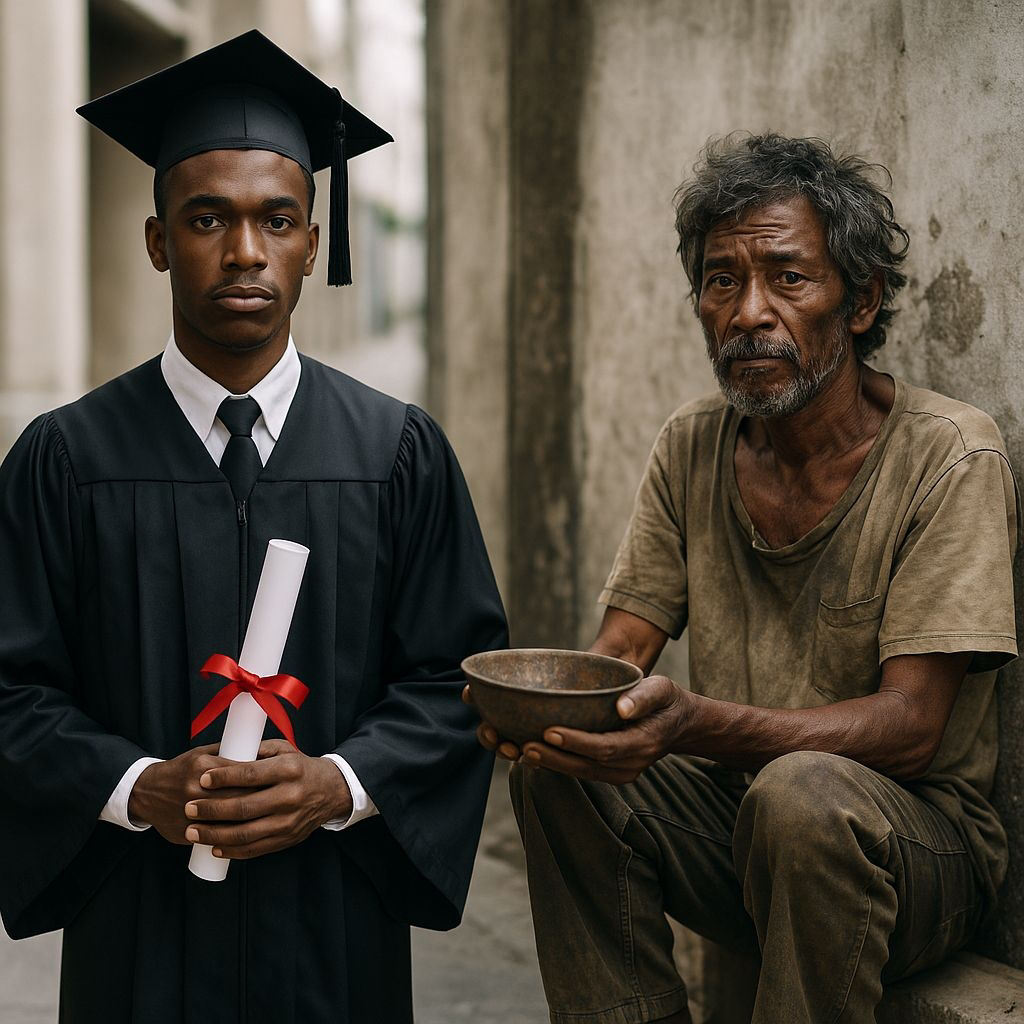June 7, 2025
By OvieOmeleh
In Nigeria today, having a university degree no longer guarantees survival. Doctors are driving taxis, engineers are learning digital marketing, and teachers are selling second-hand clothes just to make ends meet.
But if the educated—the ones society expects to succeed—are this economically battered, what happens to the uneducated, the unskilled, and the forgotten millions on the margins?
This question isn’t just emotional. It’s economic, social, and deeply urgent.
Let’s unpack the state of Nigeria’s economy in 2025 and what it really means for everyday people—especially those with little to no formal education.
GDP: Growth on Paper, Pain in Reality
Nigeria’s economy is technically growing. The GDP rose by about 2.9% in the first quarter of 2025. But most of this growth is happening in tech and telecoms—not agriculture, manufacturing, or informal trade where most Nigerians work.
So, while the numbers look good in Abuja and at global investment forums, they don’t mean much in Makoko, Minna, Yenagoa, Umuahia, Abeokuta or Maiduguri. The average market trader, farmer, or bus conductor isn’t seeing that “growth.”
Naira Freefall: Currency Crisis Hits Everyone
The naira now trades at ₦1,600/$ on the black market and around ₦1,500/$ officially.
What does this mean?
• Imported goods cost more.
• School fees, drugs, fuel—everything is more expensive.
• Salaries lose value before you can spend them.
If a civil servant with a degree can’t buy a bag of rice without budgeting for it weeks in advance, how does a roadside seller with no education survive?
Inflation: The Silent Crisis
Inflation is above 33%, with food inflation over 40%.
A loaf of bread costs nearly ₦1,200. A bag of rice is ₦65,000. Eggs, onions, garri—everything costs more than it did just a few weeks ago.
This hits the poor hardest. When you’re living on daily income with no savings or stable job, any increase in prices is devastating.
Minimum Wage: Still a Dream
Nigeria’s official minimum wage is still ₦30,000/month (about $20 at current rates). The government has proposed a new one—₦75,000—but it’s stuck in negotiations.
Even if approved, will state governments pay it? Will private businesses comply?
Most Nigerians aren’t even officially employed. They hustle.
They survive. And minimum wage debates don’t reach them.
Fuel Subsidy Removal: A Double Blow
Since subsidies were removed in 2023, fuel prices have more than tripled. Transportation costs are insane.
A ₦200 ride in 2022 now costs ₦700. Small business owners are spending more on fuel for generators than on inventory.
The poor, who spend a bigger share of their income on transport and basic goods, are left stranded—literally and economically.
Insecurity: When Livelihood Becomes a Risk
From banditry to kidnappings, insecurity remains a national crisis. Farmers can’t go to their land.
Traders are scared to travel. Even school children are at risk.
When people can’t work safely, they can’t earn. And when they can’t earn, desperation kicks in. Crime rises.
Fear spreads. The cycle continues.
So… How Do the “Uneducated” Survive?
Here’s the hard truth: they’re barely surviving.
The unskilled and uneducated often:
• Rely on informal, unstable jobs.
• Depend on relatives, religious charity, or community support.
• Sleep hungry or skip meals to feed children.
• Are the first to lose jobs, and the last to be considered for any formal opportunity.
They’re invisible in most policy discussions, yet they form the backbone of the informal economy.
When life becomes this hard for the educated middle class, those below them on the ladder are often in free fall.
What Needs to Change?
If Nigeria is to survive this economic storm and not lose an entire generation to poverty, frustration, and hopelessness, these steps are urgent:
1. Raise and enforce a realistic minimum wage.
2. Reintroduce targeted subsidies for the poor—especially in transport and food.
3. Invest in rural security and agriculture.
4. Offer free or subsidized vocational training for unskilled workers.
5. Provide social safety nets—cash transfers, healthcare, education for low-income families.
6. Tackle the forex crisis and support the naira with real productivity, not just oil.
7. Include the informal sector in national economic planning.
Final Thoughts: A Nation on Edge
Nigeria’s crisis is not just about inflation or currency or politics. It’s about survival.
And if survival is this difficult for the educated, then the pain of the unlearned, the unconnected, and the unheard must be beyond measure.
It’s time to stop focusing only on macroeconomic numbers and start building policies that feed, protect, and empower real people—starting with those who’ve been left behind the longest.
What are you seeing in your area? Are you educated and still struggling? Or do you know someone without formal education trying to make it?
Share your story in the comments.
#NigerianEconomy #Inflation #MinimumWage #FuelSubsidy #Insecurity #Poverty #Blog


.jpg)









0 Comments